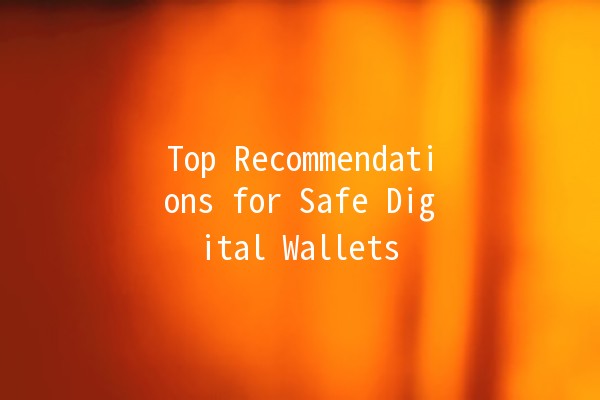
In today's digital age, the importance of securing your finances cannot be understated. As more individuals and businesses transition to digital currencies, it becomes increasingly critical to choose a safe digital wallet for storing your digital assets. This article will explore various options for safe digital wallets, offering insights into their features, security measures, and usability. Additionally, we will share practical tips to enhance your overall digital wallet experience.
What Are Digital Wallets?
Digital wallets are software applications that allow users to store, send, and receive digital currencies or cryptocurrencies. These wallets come in various forms, including mobile wallets, desktop wallets, web wallets, and hardware wallets. Each type has its own advantages and drawbacks, but the primary concern should always be security.
Types of Digital Wallets

Recommended Safe Digital Wallets
The Ledger Nano X is a hardware wallet that provides an excellent mix of security, portability, and usability. With Bluetooth capabilities, users can store over 1,800 cryptocurrencies. Its builtin security features include twofactor authentication (2FA) and a secure element chip. To illustrate, a user could store a portion of their Ethereum and Bitcoin while utilizing its mobile app for seamless transactions.
Another reputable hardware wallet is the Trezor Model T, wellknown for its robust security features. It features a touch screen interface and supports various cryptocurrencies. Its compatibility with numerous thirdparty wallets enhances user flexibility, while its opensource code allows for security transparency. A practical application would be for a user to hold their Bitcoin securely and regularly monitor their portfolio with compatible apps.
For users who prefer a desktop wallet, Exodus offers userfriendly design and multicurrency support. A key feature is its builtin exchange, allowing users to swap between cryptocurrencies without leaving the application, significantly improving productivity. For instance, a user can invest in various cryptocurrencies quickly and efficiently while tracking market trends within the app.
Coinbase Wallet is an excellent option for beginners seeking a webbased wallet. It provides a userfriendly interface and solid security features, such as private key management and biometric security. A practical use case is a novice trader utilizing Coinbase Wallet to buy small amounts of different cryptocurrencies and benefit from its integration with the Coinbase exchange for quick trades.
Trust Wallet is a mobile wallet owned by Binance that offers an intuitive interface and supports numerous cryptocurrencies. With decentralized applications (dApp) browsing, users can engage in decentralized finance (DeFi) and nonfungible tokens (NFTs). For example, a user might buy and sell NFTs directly from Trust Wallet while managing their cryptocurrency portfolio.
Tips for Enhancing Your Digital Wallet Experience
Utilizing 2FA is crucial for securing your digital wallet. This adds an extra layer of security by requiring a secondary form of identification, such as a text message or authentication app. Ensure you enable 2FA on all your wallets and exchanges to minimize the risk of unauthorized access.
Keeping your wallet software updated ensures you have the latest security patches and features. Developers regularly release updates to fix vulnerabilities. For instance, if you're using a desktop wallet, configure it to alert you when updates are available, ensuring your wallet remains as secure as possible.
Backing up your wallet allows you to recover your funds in case your device is lost or damaged. Most wallets provide recovery phrases— a set of words that you should write down and store securely offline. For instance, if you were to lose your phone with a mobile wallet, you could quickly restore your wallet on a new device using the recovery words.
Create complex and unique passwords for your wallets and associated accounts. Avoid using easily guessable information like birthdays or common words. Utilize a password manager to generate and store your passwords securely.
Regularly educate yourself about current security threats related to digital wallets and cryptocurrencies. Follow credible sources, forums, and newsletters to stay updated on potential scams, phishing attacks, and new security practices.
Frequently Asked Questions
The safest type of digital wallet is a hardware wallet. Hardware wallets, such as Ledger Nano or Trezor, store your private keys offline, making them less vulnerable to online hacks. If you are serious about securing your digital assets, investing in a hardware wallet is advisable.
Mobile wallets can be secure if you take the necessary precautions. Ensure that you use reputable wallet apps, enable biometric security, and keep your device updated. However, mobile wallets are generally not as secure as hardware wallets due to potential exposure to malware and viruses.
Yes, losing access to your digital wallet can result in the loss of your cryptocurrencies. This can happen due to forgetting your recovery phrase, losing a device, or falling victim to phishing attacks. Always back up your wallet and follow best security practices to minimize risks.
Choosing the right digital wallet depends on your specific needs. Consider factors such as the types of cryptocurrencies you want to store, ease of access, security features, and your level of experience. A beginner might prefer userfriendly options like Coinbase Wallet, while experienced users may opt for hardware wallets.
Fees can vary significantly between wallets. Many transactions, especially in web wallets and exchanges, can incur fees due to network congestion, exchanges, or trading fees. Review the fee structures of different wallets and platforms to ensure they align with your usage patterns.
Yes, alternatives to digital wallets include traditional banking services, such as bank accounts, or even cash. However, these alternatives do not provide the same flexibility and convenience for handling cryptocurrencies. Digital wallets remain the most efficient method for managing and transacting in digital currencies.
By selecting a secure digital wallet and following best practices for digital asset management, users can confidently navigate the world of cryptocurrencies. Staying informed and proactive about security can significantly enhance the experience while mitigating risks effectively.

